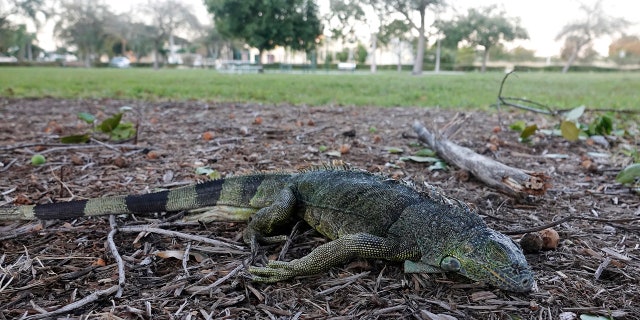Florida iguanas unaccustomed to the state’s recent cold weather are falling from trees, weather officials said.
The reptiles that usually thrive in Florida’s warm climate have been stunned by the state’s recent streak of low temperatures, which causes them to lose their grip and fall from trees onto unsuspecting residents, the National Weather Service has warned, Fox 13 of Tampa Bay reported.
IGUANA NIGHTMARE: MASSIVE IGUANA POPULATION TURNS FLORIDA INTO ‘JURASSIC PARK’
Florida is experiencing the coldest temperatures in almost a decade and freeze warnings have been posted throughout the state, Fox News Senior Meteorologist Janice Dean said during a segment of “Fox & Friends” last week.
A stunned baby iguana lies in the grass at Cherry Creek Park in Oakland Park, Fla., Wednesday, Jan. 22, 2020.
(Joe Cavaretta/South Florida Sun-Sentinel via AP)
This drastic change in weather is not particularly harmful to iguanas, Dean said; but, residents should be watchful of them as males can grow to nearly five feet long and weigh nearly 20 pounds.
“It is so cold in Florida, they are setting record temperatures and you know they’re afraid of the iguanas falling off the trees,” Dean added. “They don’t freeze, they don’t die, but they do kind of go into a state of hibernation, it’s crazy.”
CLICK HERE TO GET TO GET THE FOX NEWS APP
Iguanas are also not otherwise dangerous or aggressive to humans and they are allowed to be kept as pets. They have existed in the southern part of the state since the 1960s and prefer the tropical climate of South Florida, the Caribbean, and Central and South America, Fox 13 reported.

A stunned iguana lies in the grass at Cherry Creek Park in Oakland Park, Fla., Wednesday, Jan 22, 2020.
(Joe Cavaretta/South Florida Sun-Sentinel via AP)
The green iguanas, common in the Sunshine State, are an invasive species that are not native to the state, the Florida Fish and Wildlife Conservation Commission said, according to the report.